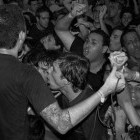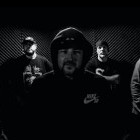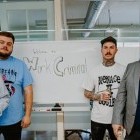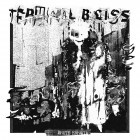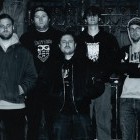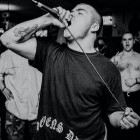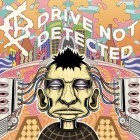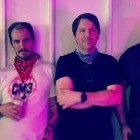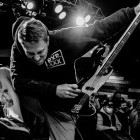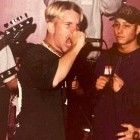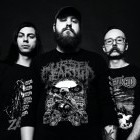
2019 is finally here— not that I would know, since I was in the hospital from the tail-end of December all the way until a few days ago. When you’re in a hospital bed for days on end, there’s not much you can really do except sit around and think about stuff. I’m terminally obsessed with hardcore, so I spend an inordinate amount of time thinking about what’s going on with it, musically and culturally. There is one big thing that I observed throughout 2018: hardcore is experiencing a moment in the mainstream, and it doesn’t seem to be getting weaker any time soon.
Let’s get some of the obvious dissensions out of the way. Firstly, hardcore will always remain a predominantly DIY community. Rock music in general is no longer the main zeitgeist nor the predominant sound of youth culture, and we’ve all read the thinkpieces about how hip-hop has taken its place (hip-hop actually does factor into all of this, in fact). I don’t think we have to worry about hardcore being taken over by “normies." Secondly, hardcore has definitely flirted with mainstream acceptance a few times now, from the '80s when Black Flag got signed to MCA (even though they got fucked over), to the '90s when several hardcore bands got signed to Ray Cappo’s Roadrunner imprint Supersoul, to the 2000s when even H2O somehow got a major label deal. What is happening right now is different, more noticeable, and will probably last longer.
Let’s look at the facts. By the end of 2017, Code Orange and Turnstile had both signed to Roadrunner (astonishing that Roadrunner is relevant again, but that’s a different article). Code Orange have been nominated for a fucking Grammy for Forever. I defy you to name another hardcore band that have reached that level of notoriety, and then capitalized upon it in order to collaborate with a commercial rock behemoth like Corey Taylor, or play at WWE while bringing along a member of a more underground band like Incendiary. Turnstile’s Time & Space and Vein’s errorzone both charted like crazy for hardcore releases (even more impressive in Vein’s case, as their LP came out on Closed Casket Activities), made several appearances on 2018 year-end lists, and have been profiled by massive media outlets like Rolling Stone and Forbes.
Turnstile are slated to play Coachella. Knocked Loose didn’t release anything this year, but their cult continues to grow and they are equally accepted playing shows with massive bands like Beartooth as well as with hardcore stalwarts Every Time I Die. Hell, even Jesus Piece are starting to get some degree of mainstream recognition, while Prosthetic, a big metal label, is taking a chance on a small screamo band called Wristmeetrazor.
So, why is this happening? There are a couple factors that we could take into consideration. Maybe young people are angrier than they have been in a long time, after being consistently screwed over by older generations, having their identities dismissed, and consistently getting ignored when they speak up about the social issues that are plaguing them. Maybe major labels are just more willing to take a chance on heavy bands now that the ceiling for success is lower and it’s easier and more financially viable to sign more “out-there” acts. These are all valid suppositions, but I propose that something different is happening: the influence of hip-hop.
If kids these days pay attention to anything, it’s the words of the entertainers they idolize, and a whole lot of them are at least paying lip service to the influence of punk and hardcore on their music. From the bleak and oppressive definitely-not-horrorcore of New Orleans rap duo $uicideboy$ (Ruby used to play in plenty of local punk bands) to the high-octane industrial sheet metal raps of New York’s City Morgue (ZillaKami frequently reps the shirts of artists like GG Allin in their videos), today’s rappers seem to be far more grounded in the musical world of punk and hardcore than they have been in the past. This shows in the crossover of audiences as well, with Ghostemane and Wavy Jone$ touring with hardcore bands like Code Orange, Vein, and Bitter End.
Aesthetically, this at least makes sense because hardcore bands and these so-called trap metal/shadow rap/whatever artists both scream a lot, rely on heavy, propulsive, danceable rhythms, and employ the use of screechy guitar noise in their music. However, even softer artists like emo rap troubadour Wicca Phase Springs Eternal have gotten in on these package tours (which also does make sense— Adam of Wicca Phase used to be in Tigers Jaw, who have a litany of hardcore connections of their own).
Friend of No Echo and head of the Punk Rock MBA, Finn McKenty, has spoken several times about what he calls “crossover culture,” essentially a unified theory of counterculture that holds that previously disparate passions like hardcore, graffiti, skateboarding, and hip-hop have all melded into one single subculture that is the driving force of youth culture at the moment. While one could certainly argue (as No Echo has in the past) that all of these things have indeed been connected for decades, now that hip-hop is the most dominant it’s ever been in the mainstream, the connections between all of these things has only become more blatant and it’s exposed a lot more kids to hardcore than ever. Besides, it’s only logical that kids who are into the dark, occult imagery of Three 6 Mafia (the single biggest influence on this current wave of Soundcloud rappers) would get into the same type of music that fostered Dwid of Integrity’s Holy Terror cult.
Is hardcore truly mainstream? Definitely not. I don’t see Lil Uzi Vert fans deep-diving into Botch’s discography no matter how many times he goes to Lorna Shore shows. But Playboi Carti’s Bad Religion tattoo probably did expose a ton of kids to that band, the same as kids who are into Shakewell might check out his old band Betrayal, or how Lil Ugly Mane fans might check out Jesus Piece based on how much LUM reps their merch. Personally, I’m in favor of getting as many people as possible into hardcore, as the diversity of voices and experiences will always lead to more varied and altogether better music.
For right now, though, it’s best for us to ride the wave that Code Orange currently sits at the crest of. Maybe one day we’ll see an Unbroken reunion tour hit the stadiums, but until then, it’s cool as fuck to see the rest of the world finally tune into something that means the world to me and so many others.


